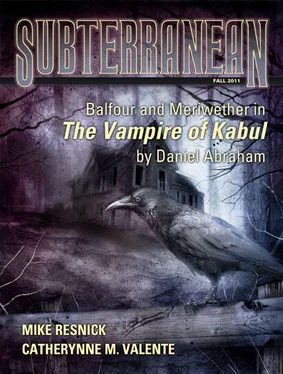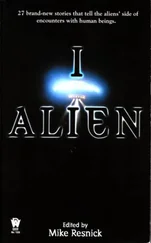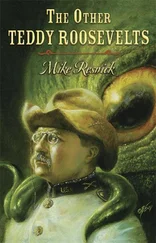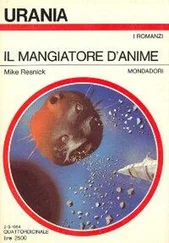Mike Resnick - Shaka II
Здесь есть возможность читать онлайн «Mike Resnick - Shaka II» весь текст электронной книги совершенно бесплатно (целиком полную версию без сокращений). В некоторых случаях можно слушать аудио, скачать через торрент в формате fb2 и присутствует краткое содержание. Год выпуска: 2011, Издательство: Subterranean Press, Жанр: Фантастика и фэнтези, на английском языке. Описание произведения, (предисловие) а так же отзывы посетителей доступны на портале библиотеки ЛибКат.
- Название:Shaka II
- Автор:
- Издательство:Subterranean Press
- Жанр:
- Год:2011
- ISBN:нет данных
- Рейтинг книги:3 / 5. Голосов: 1
-
Избранное:Добавить в избранное
- Отзывы:
-
Ваша оценка:
- 60
- 1
- 2
- 3
- 4
- 5
Shaka II: краткое содержание, описание и аннотация
Предлагаем к чтению аннотацию, описание, краткое содержание или предисловие (зависит от того, что написал сам автор книги «Shaka II»). Если вы не нашли необходимую информацию о книге — напишите в комментариях, мы постараемся отыскать её.
Shaka II — читать онлайн бесплатно полную книгу (весь текст) целиком
Ниже представлен текст книги, разбитый по страницам. Система сохранения места последней прочитанной страницы, позволяет с удобством читать онлайн бесплатно книгу «Shaka II», без необходимости каждый раз заново искать на чём Вы остановились. Поставьте закладку, и сможете в любой момент перейти на страницу, на которой закончили чтение.
Интервал:
Закладка:
“Then, to be totally accurate, we should claim an Empire of four worlds, not seven,” said James Mkhize, who was not quite an aide or an advisor, though he sat in on all policy meetings. As nearly as I could tell, he had appointed himself as Tchaka’s biographer, and it amused Tchaka to let him act as such.
“Seven,” Tchaka replied.
“But—”
“If the original Tchaka had avoided all Shona, Matabele, Swazi and Xhosa lands, would the first Zulu empire have ever grown beyond the size of a large farm?”
Mkhize wisely chose not to argue the point—people who argued with Tchaka tended to disappear—and asked what type of sentient life existed on the three worlds.
“I’ve no idea,” answered Tchaka.
“Will they object to our presence?”
Tchaka seemed amused. “Does it matter?”
“No,” said Mkhize quickly.
“They have not yet achieved space flight,” continued Tchaka. “They will present very little problem.”
“Which planet will be your headquarters?” I asked.
“I will look them over and then decide,” answered Tchaka. “In the meantime, we need to populate these worlds. I have already sent word back to Pretoria that the government will pay to transport any Zulu who is willing to emigrate to any of them.”
“Including the three populated worlds?” asked Mkhize.
“Of course. They will be pacified before the first Zulu colonists arrive.”
And it was as Tchaka had said.
He named the seven worlds after seven Zulu kings and princes—Mpande, Cetshwayo, Dinuzulu, Mthonga, Bakuza, Jama, and Mbuyazi. It was the last three that held sentient populations. I almost said “alien populations”, but of course on their worlds we were the aliens, not they.
The inhabitants of Bakuza were humanoid—small, quick, shaggy bipedal beings averaging less than five feet in height. They still lived in their culture’s equivalent of the stone age. They were primarily nomadic, and they had just invented clublike weapons to bring down the herbivores that shared their planet. Arrayed against them were Tchaka’s warriors, armed with laser and sonic weapons, pulse guns, and projectile weapons. We had body armor; they had none. We had rudimentary force fields to protect us from any incoming weapons; they had none. We of course had equipment that allowed us to see in the dark; they were all but blind at night.
The Battle of Bakuza took three days. The totals were staggering: four Zulus dead, three wounded; eight hundred thousand Bakuzans dead, another ninety thousand wounded.
Tchaka contacted Peter Zondo, one of our half-brothers, whom he had placed in charge of the “pacification” of Bakuza, and told him to send out parties in all directions from wherever Zondo chose to make the new capital of the planet, and elicit pledges of loyalty from the Bakuzans.
“And if any should refuse?” asked Peter.
“Kill them.”
“We may need them to work the fields once we begin cultivating the planet,” said Peter. “Perhaps we should invite them to—”
“Kill them,” repeated Tchaka, breaking the communication. He turned to an aide. “Have Captain Nene make sure he does what I have told him to do.”
“And if not?”
“Kill him, too,” said Tchaka, as if the question was too foolish to have been asked.
Jama’s inhabitants were like nothing anyone had ever seen before. I’d say they looked like centaurs, but even that is misleading. They had short stubby legs, elongated bodies, narrow torsos, and heads that seemed composed entirely of wrinkles. They had no eyes, but possessed some unknown sense that functioned every bit as well, because I never saw one trip over or bump into anything. They had a complex social order, but no technology. They greeted us with open arms—well, that’s a misstatement; they didn’t have any arms, not by our definition—and seemed happy to give us all the land we wanted. They had no objection to being impressed into labor camps, and in fact seemed so totally lacking in resentment that many of us felt that, social order or not, they were equally lacking in sentience. After all, ants have a complex social order, and no one claims that they are sentient.
Mbuyazi was the most traditional of the three populated planets. They were humanoid, they had sophisticated weapons (though nothing to match our firepower; theirs would have been better suited for warfare in the late 19th or early 20th centuries), and they had no intention of sharing their planet with anyone.
It was a bloodbath. They simply wouldn’t surrender, and every adult and child fought to the death. In something under six weeks we had killed every last one of them, and even some of Tchaka’s most hardened soldiers were sickened by the slaughter.
But when the dust had cleared, the Zulu Empire was in complete possession of seven worlds, and every day brought immigrants from Earth’s thirty-five million Zulus to each of the worlds. Tchaka chose Cetshwayo as his headquarters world, and within a month a small city had been erected, with the Royal Palace dominating the landscape. Before long he had palatial dwellings on each of the worlds, and small cities were springing up on all of them.
We had no idea how Earth’s war against the chlorine breathers was coming along, but one day we received a communication, not from Dolores Sanchez but from Alexander Petrovitch, whose signature appeared over the title: “President of United Earth”. He thanked us for adding seven worlds to the fold, and announced that he would soon send his representatives out to examine them.
Tchaka responded instantly. The seven worlds—he used their new names—were part of the Zulu Empire, and were in no way connected to or under any obligation to Earth. They would pay no taxes, accept no military conscription, and would not give Earth a Most Favored trading status.
There was no answer for the next three days. We were all starting to get nervous, waiting for the other shoe to drop.
How could we have known it would be Tchaka’s?
14.
Earth announced that it was considering applying economic sanctions to get Tchaka to fall in line. It insisted that the Zulu Empire agree that we were actually a series of United Earth colonies, loyal and beholden to Earth and no one else.
“What do you think?” I asked as I read the communiqués.
“They have always lacked imagination,” replied Tchaka. “Even worse, they lack audacity.”
He closeted himself with his military leaders and his astrologer for a long afternoon. No one else was permitted in, none of his advisors or aides knew what the conference was about, and he didn’t see fit to tell us.
We found out soon enough.
Two days later one of our ships exploded halfway between Cetshwayo and Mthonga. Tchaka claimed it had been attacked by a United Earth ship and demanded reparation.
Earth denied any involvement in the incident.
“Then,” announced Tchaka in a broadcast that reached not only the seven planets but Earth itself, “we shall decide upon a fitting reparation and claim it.”
That night I checked the reports to find out how many of our men had been killed or wounded in the sneak attack. There were eleven names; all had been killed. But something troubled me about two of those names, and I checked further—and found that the two names I recognized, plus the other nine, had actually died in battle against the natives of Mbuyazi.
Tchaka, who rarely slept more than three or four hours a night, and was often seen wandering the halls and offices of his new headquarters in the dead of night, entered my office just as I made my discovery.
I looked up at him. “Did we really lose a ship at all?” I asked.
“Does it matter?” he replied. “We wanted an incident. Now we have one.”
Читать дальшеИнтервал:
Закладка:
Похожие книги на «Shaka II»
Представляем Вашему вниманию похожие книги на «Shaka II» списком для выбора. Мы отобрали схожую по названию и смыслу литературу в надежде предоставить читателям больше вариантов отыскать новые, интересные, ещё непрочитанные произведения.
Обсуждение, отзывы о книге «Shaka II» и просто собственные мнения читателей. Оставьте ваши комментарии, напишите, что Вы думаете о произведении, его смысле или главных героях. Укажите что конкретно понравилось, а что нет, и почему Вы так считаете.












